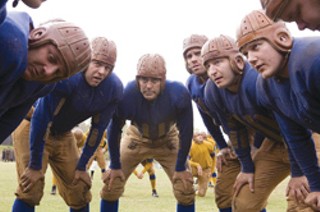Leatherheads
Football may be a rough-and-tumble sport, but Leatherheads is handled by director and star George Clooney with the delicacy one extends toward an antique vase. Working from a script by acclaimed sports writers Duncan Brantley and Rick Reilly, Clooney offers an occasionally wistful look at the early days of professional football, when its popularity was nil and it was viewed as college football’s deformed and ignored stepbrother. The year is 1925, and Dodge Connolly (Clooney) has managed to scrape together a career as a football player, assembling his motley crew to travel all over the country to play games in which attendance is anemic, rules are nonexistent, and a player is as likely to throw a punch as catch the pigskin. Just as it appears the entire league will have to fold, Dodge comes up with a brainstorm. Why not convince Carter “The Bullet” Rutherford (John Krasinski), the nation’s most popular college football star, to put his studies on hold and join the pro ranks? Carter agrees just about the time that the Chicago daily has elected to send one of its best reporters, tough-talking Lexie Littleton (Renee Zellweger), to determine the authenticity of Carter’s WWI exploits. Gaining access to the team, Lexie uses her feminine wiles to cozy up to Carter, all the while engaging in verbal jousts with Dodge. Clooney is an unabashed lover of classic screwball comedies from Hollywood’s Golden Era, and he’s gone on record stating that his influences for Leatherheads included such great directors as Howard Hawks and George Cukor. His greatest (unacknowledged) influences, however, stem from more recent times, as it’s difficult to watch this film without being reminded of the pair of pictures he made with Joel and Ethan Coen. Perennially growing in stature as an actor and director, it’s easy to envision Clooney studying the Coens’ M.O. while perched on their sets, since Leatherheads sports the same burnished period look as O Brother, Where Art Thou? and the same screwball comedy stylings as the underrated Intolerable Cruelty. Clooney is on his game as the aging brawler who’s disheartened by the rigid direction the sport starts to take, but the likable Krasinski often gets defeated by the restrictions of his colorless part. And as Lexie, Zellweger delivers the script’s zingers with aplomb, even if she isn’t outwardly quite as brash or brassy as the role requires. Leatherheads is full of visual sight gags, whether the humor derives from elaborate setups (the final football game is full of nicely choreographed physical comedy) or merely from repeating the same shot for maximum potency (dig the guy in the swimming pool).
Stop-Loss
Sign of the Times, Part I: While accepting his Oscar in 2003, Michael Moore is loudly booed for criticizing Bush's "fictitious" war in Iraq. Sign of the Times, Part II: During last week's advance screening of the new Iraq War drama Stop-Loss, audience members clap and cheer when Ryan Phillippe's character spits out, "Fuck the president!" As far as cinema is concerned, we're probably still several years away from the definitive Iraq War flick. Stop-Loss at least comes closer than most of the others: Rather than getting buried in ham-fisted armchair liberalism (like Lions for Lambs and Rendition), it carefully tries to include something for everyone on both sides of the war divide. Yet while this approach is a thoughtful one, it can also be a dangerous one, as evidenced by late-inning occurrences that spit in the face of anyone who has ever taken a stand on moral grounds. Helming her first film since 1999's Boys Don't Cry, director Kimberly Peirce (co-scripting with Mark Richard) centers her tale on three Texas boys who all served together in Iraq and have returned to their hometown: Brandon King (Phillippe), a natural born leader and the most intelligent of the three; Steve Shriver (Channing Tatum), a jingoistic grunt prone to repeating canned rhetoric like, "We kill them in Iraq so we don't have to kill them here in Texas!"; and Tommy Burgess (Joseph Gordon-Levitt), the hard-drinking soldier who lost his best friend in the conflict. Having served plenty of time overseas, Brandon expects to settle down stateside, so he's understandably upset when Bush's "stop-loss" policy -- basically, a backdoor draft -- requires him to head back to Iraq yet again. Refusing direct orders, Brandon instead goes AWOL, a decision that irrevocably affects both Steve and Tommy. Despite its serious intentions, Stop-Loss often plays like a softer version of The Deer Hunter, and, without revealing too much, its about-face message ultimately isn't "Fuck the president" as much as it's "Fuck yourself" -- a dispiriting message no matter how it's sliced.


























